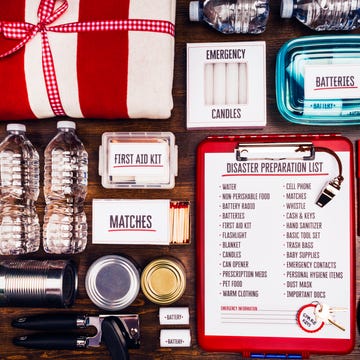Gym membership going unexercised? Running trainers hibernating at the very back of the cupboard? Don’t worry, all is not lost. “While going to the gym is beneficial, it’s not the only way to stay active,” says leading physiotherapist Sam Bhide.
Building a healthier life doesn’t necessarily rely on radical reinventions or dramatic interventions, she says. Instead: “Every small effort counts. Incorporating simple daily movements – walking to work, lifting groceries or taking the stairs – can make a significant difference,” she says. With a bit of expert advice, the things you have to do, and want to do, every day can be made to work for you.
Hacking your to-do list and embedding these humble habits into your routine means you can genuinely make a difference to your health, nutrition and wellbeing, all while barely making any effort at all.
So, as you go through the average day, here are the tiny tweaks that Bhide and other experts suggest you do at every stage… None will take you more than a minute or cost you more than a pound. Unlike your gym membership.
Waking up? Touch your toes
“After waking, sit on the bed and reach for your toes, then stand and gently bend backward to mobilise the spine in both directions – counteracting the lack of movement during sleep,” suggests Bhide.
Why? Muscles tend to tighten overnight, so stretching them first thing releases that tension. You’ll improve flexibility in your hamstrings, lower back and calves as well as the range of motion in your spine. Your posture will benefit, as will your circulation. You’ll also feel more energised.
Waiting for the kettle to boil? Stand on one leg
Standing like a stalk will build your leg muscles, your core strength and improve your coordination. But it may also help you live well for longer.
In one landmark study, those who could only stand on one leg with eyes closed for two seconds or less were three times more likely to have died over the next 13 years than those who managed 10 seconds or more.
Eating breakfast? Add cinnamon
“Add a sprinkling of cinnamon to your yogurt or porridge,” suggests nutritionist Lucy Miller. “Not only does it taste nice, it helps stabilise blood sugar and improve digestion, making it a great way to start the day.”
Putting on your makeup? Smile in the mirror
The American Heart Association (AHA) recommends this one. Why? Last year, research published in The Journal Of Positive Psychology found that smiling and speaking kindly to yourself in the mirror can boost your self-esteem and reduce anxiety.
Further research suggests that smiling triggers the release of dopamine and serotonin in the brain, the former boosting your feelings of happiness and the latter reducing your stress. Happy news!
Sitting at your desk? Look left and right
“For those who work at a desk, even small movements matter,” says Bhide. “Turning the neck side to side, rotating the back by twisting gently to one side, then the other, and stretching the upper back can relieve tension and improve circulation.” Performing quick sit-to-stand movements will also engage the muscles that fall into disuse when you sit for long periods, she says. So stand up and walk to the water cooler.
Grabbing lunch? Sprinkle some nuts
“Adding a handful of nuts or seeds to a salad will add protein, fibre, B vitamins and omega 3,” says Miller. It’s the simplest way to boost your nutrition on a busy day.
Loading the washing machine? Squat
“Throughout the day, simple activities can contribute to overall mobility and strength,” says Bhide. Carrying groceries or children counts as light resistance training, she adds. So does squatting while loading and unloading the dishwasher or washing machine. Doing so will improve your strength and stability, working muscle groups from your calves and quadriceps to your abdominals and your glutes.
Travelling? Try box breathing
Another AHA recommendation, box breathing is a technique used by US Navy SEALs during high-stakes operations, so it will probably help you navigate the ring road and school run, too. Inhale slowly for a count of four, hold for a count of four, exhale slowly for a count of four and hold again for a count of four. It works by activating the parasympathetic nervous system, reducing stress and promoting relaxation.
Walking the dog? Look at the trees
“While I’m walking, I practise mindfulness,” says Dr Barbara Sahakian, University of Cambridge neuroscientist and author of new book Brain Boost. “I focus my thoughts on trees, flowers and beautiful buildings that I’m passing on my walk and I try not to worry about the future or dwell on mistakes.”
Cooking supper? Steam, don’t boil
“Steaming vegetables instead of boiling them is an incredibly simple way to preserve more of the water-soluble vitamins such as vitamin C and Bs,” says Miller.
Steaming retains about 70-90% of these nutrients, whereas boiling can cause up to a 60% loss. “Steaming also helps maintain minerals such as calcium, magnesium and iron, whereas boiling can lose as much as 50%,” she says. “It also preserves the antioxidants and steamed veg have a lower glycaemic index, meaning that they’re less likely to cause blood sugar spikes.”













